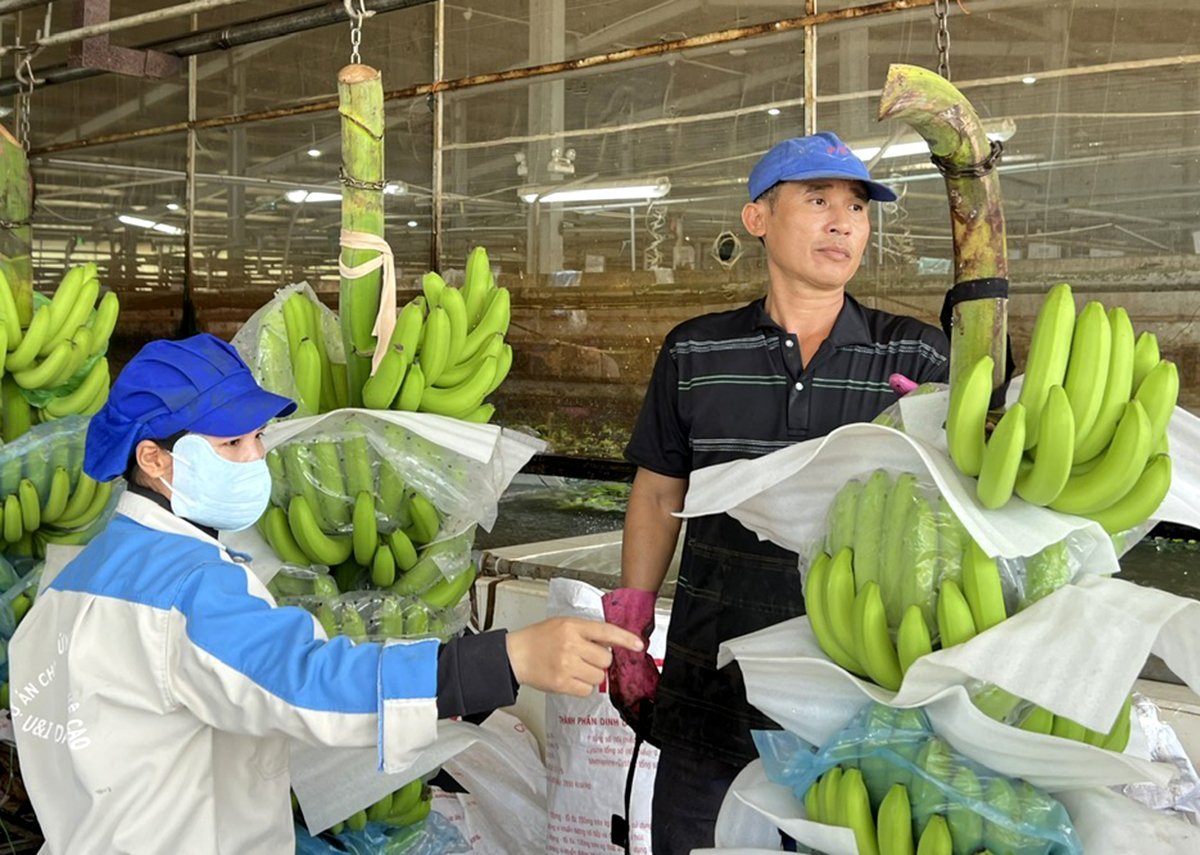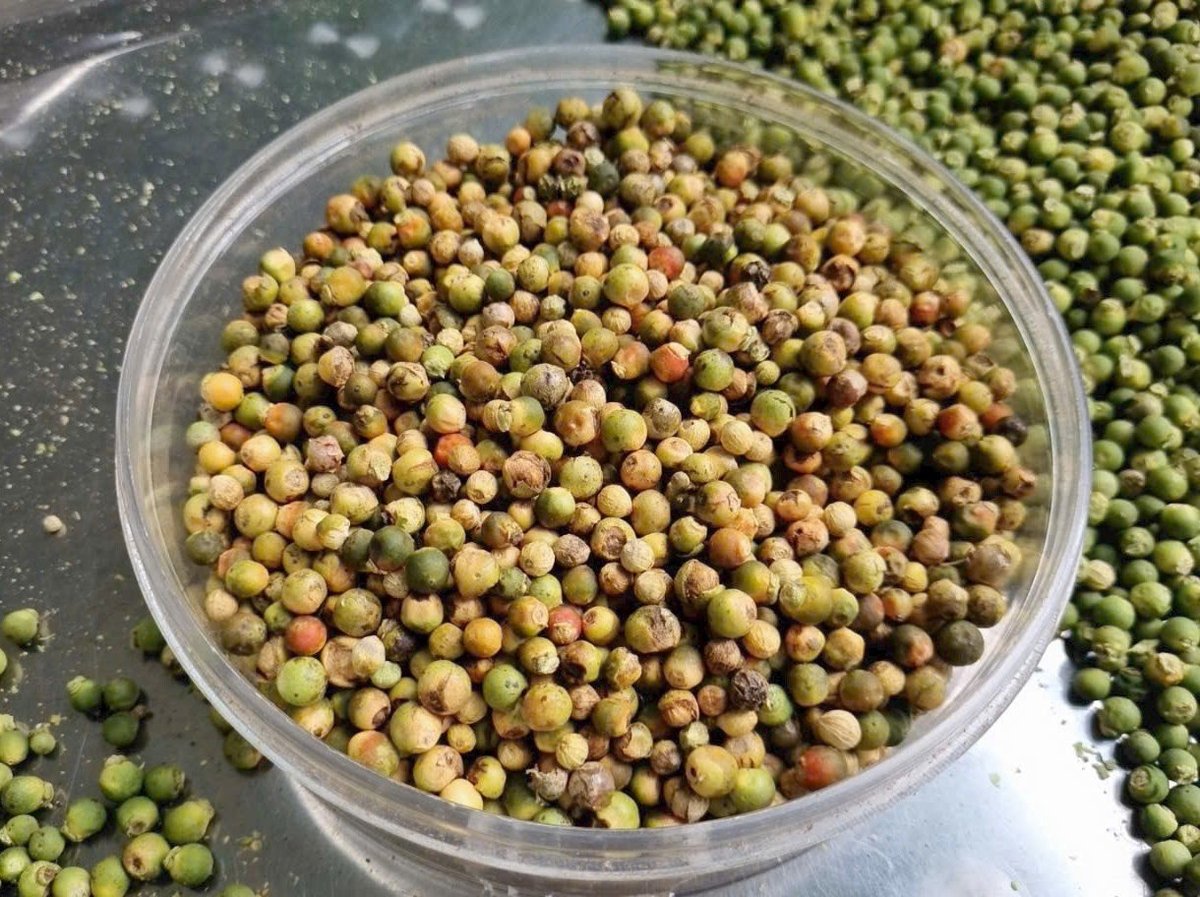November 24, 2025 | 22:49 GMT +7
November 24, 2025 | 22:49 GMT +7
Hotline: 0913.378.918
November 24, 2025 | 22:49 GMT +7
Hotline: 0913.378.918
According to Mr. Nguyen Thanh Binh, Chairman of the Vietnam Fruit and Vegetable Association, the reciprocal tariffs that the United States is imposing on Vietnamese goods will create significant difficulties for companies exporting fruit to the US. With a 20% tariff, fruit exporters to the US are left with virtually no profit.
Given the challenges posed by US tax policies on the fruit industry, Mr. Binh called for timely policies to help businesses. First, he suggested considering a temporary suspension of VAT on input materials to alleviate capital constraints for businesses.

Banana production for export at Unifarm. Photo: Thanh Son.
In addition, Mr. Binh emphasized the need for credit support, such as extending loan terms and subsidizing interest rates. The international market's volatility and difficulties have led to longer-than-usual inventory periods for exported fruit. This has significantly impacted cash flow and increased production and operating costs for businesses, making credit support essential.
Particularly in light of the retaliatory tariffs, many fruit businesses will have to shift their focus away from the US market and towards other destinations. Consequently, businesses are in great need of trade promotion support to explore new markets and diversify their export portfolio.
Mr. Nguyen Thanh Binh proposed that relevant ministries and government agencies organize more trade promotion programs and allocate additional funding for these activities to find new markets in the coming period.
For Vietnam's traditional fruit markets, such as China, Japan, South Korea, and the EU, he stressed the need for more effective exploitation, where trade promotion is crucial. For instance, in the Chinese market, Vietnamese fruit currently enters primarily through provinces bordering northern Vietnam. Therefore, it is necessary to step up trade promotion and brand promotion for Vietnamese fruit in northern and inland Chinese regions, such as Beijing, Shanghai, and Shandong.

Removing obstacles of the VAT Law will help the pepper market recover. Photo: Thanh Son.
According to Mr. Le Viet Anh, General Secretary of the Vietnam Pepper and Spice Association (VPSA), the major obstacle affecting pepper exports in particular, and agricultural goods in general, is VAT. When sourcing raw materials, pepper exporters must pay a 5% VAT. For small businesses, this can amount to hundreds of millions of dong each month. For larger enterprises, this figure can run into billions, and for leading pepper and agricultural exporters, it can even reach tens of billions of dong.
Under current regulations, pepper exporters are entitled to a VAT refund after export. However, the refund process can be excessively long, sometimes taking up to several years. This leaves businesses with insufficient capital for production and operations, significantly affecting both the domestic market and pepper exports. Therefore, Mr. Le Viet Anh believes that a timely resolution to VAT issues would provide a massive boost to pepper exports specifically and agricultural exports in general.
In its preliminary report for the first half of 2025, VPSA also highlighted that the biggest challenge facing Vietnam's agricultural exports is the lack of specific guidance from authorities on applying the VAT law to the agricultural sector. This has left exporters confused about declaration procedures, slowed down transactions, and temporarily dampened the domestic market. Once the tax policy is clarified, pepper prices will likely recover due to strong international demand.
Translated by Linh Linh

(VAN) An Giang promotes supply-demand connections, standardizes quality and builds value chains, creating a foundation for sustainable bird’s nest development and aiming to expand exports.
/2025/11/24/5339-4-nongnghiep-075331.jpg)
(VAN) Recently, the conference on 'Sustainable Fisheries Linkage Chain - Tilapia for Export' took place in Tien Hai commune, Hung Yen province.
/2025/11/21/4309-2-153400_128.jpg)
(VAN) Green and low-emission rice is paving the way for Vietnamese rice to enter high-end markets, marking the beginning of a transformation journey toward greening and elevating the national rice brand.

(VAN) ‘Right to Win’ outlines a national action plan that shapes a new vision for Viet Nam’s agriculture in an era of renewal and global integration.

(VAN) Lam Dong’s farmed sturgeon output this year is expected to reach 2,300 tons, worth VND 450 billion, affirming the brand’s position on the market.

(VAN) A surge in Ukrainian egg exports, largely driven by soaring sales to the UK over the last few years, has notably pushed up egg prices on the domestic market.

(VAN) The price of Arabica Catimor coffee in Quang Tri is currently at VND 25,000–27,000/kg (fresh cherries), the highest level ever recorded